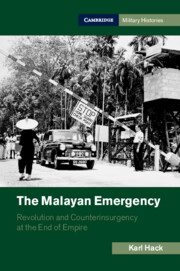Book contents
- The Malayan Emergency
- Cambridge Military Histories
- The Malayan Emergency
- Copyright page
- Contents
- Figures
- Maps
- Tables and Charts
- Preface and Acknowledgements
- Note On the Text: Language, Terminology and Measures
- Abbreviations
- Additional material
- 1 Introduction and Overview
- 2 Fatal Decisions
- 3 Terror, Counter-Terror and Pressure
- 4 Bureaucratic Counter-Terror and MNLA Main Forces
- 5 The Briggs Plan
- 6 Chin Peng and Communist Plans
- 7 Templer
- 8 Optimising Counterinsurgency
- 9 Politics, Decolonisation and Counterinsurgency
- 10 Conclusion
- Appendix 1 Emergency Statistics, 1948 to 1960
- Appendix 2 The Second Emergency, 1968 to 1989
- Glossary
- Bibliography
- Index
8 - Optimising Counterinsurgency
1952 to 1960
Published online by Cambridge University Press: 16 December 2021
- The Malayan Emergency
- Cambridge Military Histories
- The Malayan Emergency
- Copyright page
- Contents
- Figures
- Maps
- Tables and Charts
- Preface and Acknowledgements
- Note On the Text: Language, Terminology and Measures
- Abbreviations
- Additional material
- 1 Introduction and Overview
- 2 Fatal Decisions
- 3 Terror, Counter-Terror and Pressure
- 4 Bureaucratic Counter-Terror and MNLA Main Forces
- 5 The Briggs Plan
- 6 Chin Peng and Communist Plans
- 7 Templer
- 8 Optimising Counterinsurgency
- 9 Politics, Decolonisation and Counterinsurgency
- 10 Conclusion
- Appendix 1 Emergency Statistics, 1948 to 1960
- Appendix 2 The Second Emergency, 1968 to 1989
- Glossary
- Bibliography
- Index
Summary
Over 1953–60 counterinsurgency was optimised, buidling upon the solid foundations of geodemographic control achieved over 1950–2, and of systems optimisation achieved under Templer. Framework operations by units bolted onto localities were continuously refined, as was the use of jungle forts to win over the Orang Asli, and of big combined Special Branch–food control–military operations. Together these sustained an ‘elimination’ rate (kills, surrenders, captures) of about 20 per cent of insurgents a year – that is, until after the MCP attempt to negotiate at Baling in 1955 was rebuffed, and then further negotiation was refused from late 1957. As hope faded insurgent ‘surrenders’ (some induced or duped) snowballed in the face of priority big operations. By now those featured months-long intense controls, each targetting the entire area of one or more MCP committees. That way the MCP would struggle to regenerate afterwards. The collapse of local MCP forces often came as freedoms increased elsewhere, while a big operation clamped down more strongly than ever on the targetted area. In 1958 the MCP decided on a strategy of running down the military campaign, and the Emergency was formally ended on 31 July 1958.
Keywords
- Type
- Chapter
- Information
- The Malayan EmergencyRevolution and Counterinsurgency at the End of Empire, pp. 340 - 385Publisher: Cambridge University PressPrint publication year: 2021



